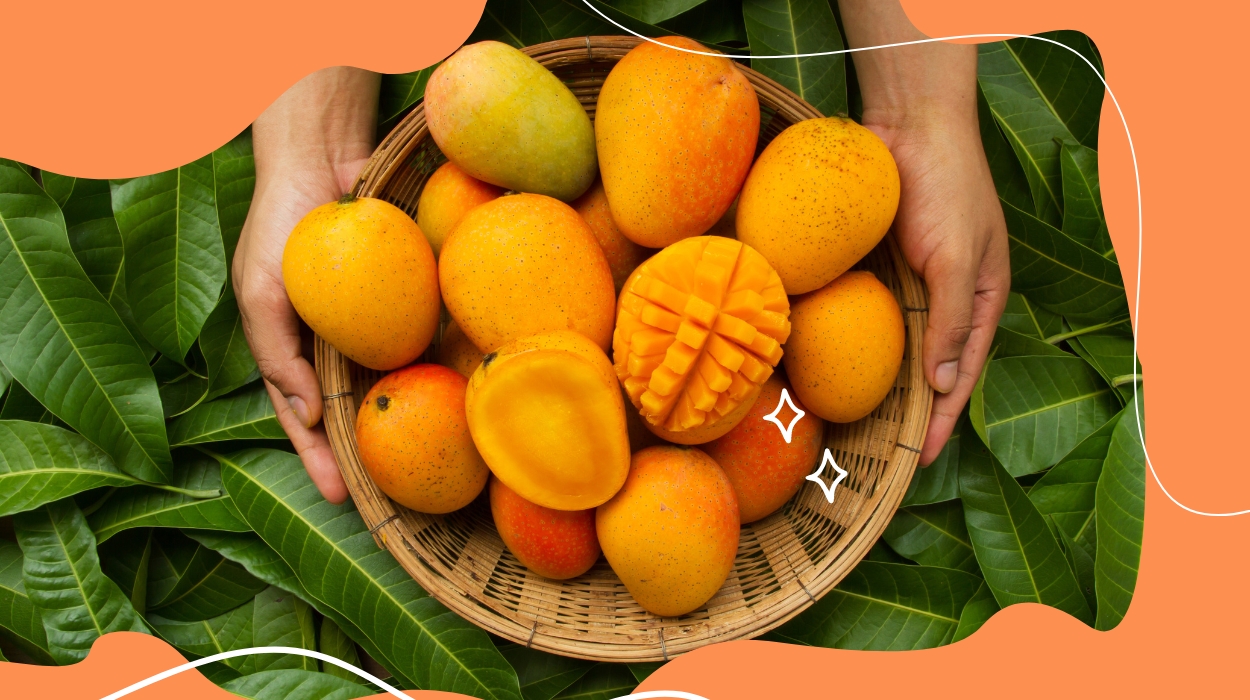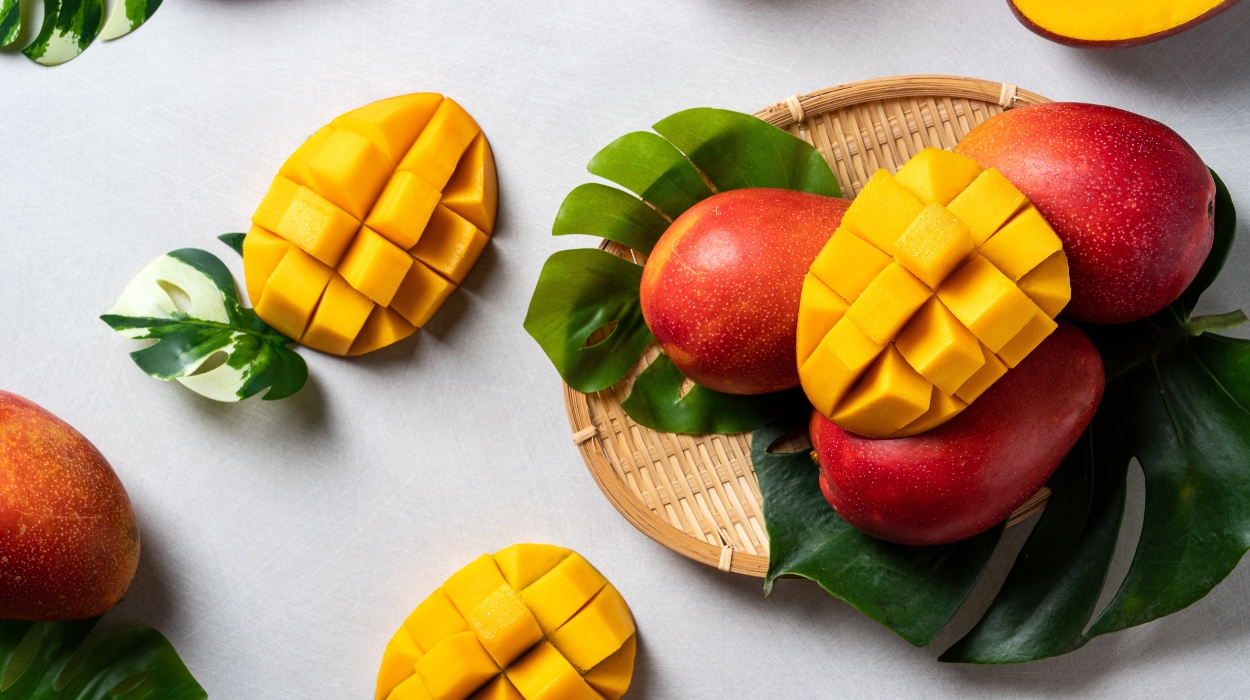 Expert's opinion
Expert's opinion
Expert's opinion
The article is a subjective view on this topic written by writers specializing in medical writing.
It may reflect on a personal journey surrounding struggles with an illness or medical condition, involve product comparisons, diet considerations, or other health-related opinions.
Although the view is entirely that of the writer, it is based on academic experiences and scientific research they have conducted; it is fact-checked by a team of degreed medical experts, and validated by sources attached to the article.
The numbers in parenthesis (1,2,3) will take you to clickable links to related scientific papers.
Is Mango Good For Weight Loss? Here’s The Truth To Know 2024

Mangoes are a trendy fruit because of their delightful flavor. In addition, they are very easy to add to most snacks and meals. However, given its intensely decadent flavor, you might wonder if eating mango is good for weight loss.
If you love the sweet taste of mangoes, don’t worry, they can be an excellent addition to your weight loss routine. Read on to learn why this delicious fruit is ideal for weight loss and how to consume them.
Is Mango Good For Weight Loss?
Absolutely, and they are multiple great reasons why. For example, mangoes are rich in polyphenols,[1] sometimes called vitamin P, which are compounds found in plants and loaded with many health benefits that can help you lose weight. These polyphenols, along with other nutrients in mangoes, fight off free radicals, protect against oxidative stress, and help control blood sugar.
Mangoes are delicious and a great way to increase the tastiness of any fruit salad or snack. The Dietary Guidelines for Americans[2] (2020-2025) recommends eating almost three cups of fresh fruit daily, including mangos.
Mango’s Rich Nutritional Profile
The Nutritional Facts[3] are per 1 cup of fresh, diced mangoes:
- Calories: 105 calories
- Protein: 1 gram
- Fat: 0.5 grams
- Carbohydrate: 25 grams
- Fiber: 6 grams
- Vitamin C: 60 milligrams
- Vitamin A: 89 micrograms
- Potassium: 277 milligrams
How Eating Mangoes Helps Lose Weight
There are multiple reasons why consuming mango fruit can help you lose extra unwanted weight. Continue reading to find out why.
Vitamin C
Per the United States Department of Agriculture,[3] one cup of fresh-cut mango provides almost 75% of your daily vitamin C requirements.
Vitamin C helps regulate insulin levels, which tell your body to store fat, thus helping with weight loss. It is also part of an amino acid that helps you burn fat. In addition, vitamin C status is related to body mass index,[4] with those having the lowest blood levels of vitamin C demonstrating a higher body mass index.
Another way vitamin C helps with weight loss is by fighting off free radicals and oxidative stress that form in the body during exercise. Further studies[5] are needed, but preliminary studies show that ingesting vitamin C before working out lowers the inflammation[6] in your body during exercise. This can be helpful with weight loss as your body can recover faster from workouts and thus exercise for more extended periods before getting fatigued.
Vitamin C also helps your body to absorb iron. Iron is essential to deliver oxygen throughout your body and muscles. More oxygenated muscles help burn fat and, thus, enhance weight loss benefits.
Being a potent antioxidant, vitamin C can also help with chronic inflammation within the body. The connection between inflammation and obesity is complicated, but the relationship is strong.
People used to think losing weight was a simple equation of eating fewer calories than you take in, but the relationship is more complex than that. There are many factors to be considered in the complexities of the weight loss process, such as food sensitivities, stress, the microbiome of your gut, etc.
Even though there is a multitude of factors, there is a common denominator among them: they all produce inflammation.[6] Inflammation and weight gain are so interconnected researchers say that one causes the other and thus develops an unhealthy and vicious cycle.
One way to break this cycle is by eating high-anti-inflammatory foods that will fight off inflammation and, thus, weight gain. As stated several times previously, mangoes are potent antioxidants, thus decreasing inflammation and aiding in weight loss. Other high-antioxidant foods include berries, lemons, oranges, avocados, and other fruits and vegetables.
Polyphenols
Mangoes are loaded with polyphenols. Polyphenols are plant-based compounds that are loaded with health benefits and antioxidants. These polyphenols, like vitamin C, can help your body tolerate more strenuous workouts and help it recover from oxidative stress during exercise. Enhanced ability to recover means an improved ability to perform during training and thus burn more calories.
Fiber

Mangoes contain about 10% of your fiber needs daily in just one cup.
Dietary fiber helps overweight people lose weight[7] independent of their macronutrient intake or calories consumed. Fiber recommendations are[8] 14 grams per 1,000 kilocalories. Mangos have 6 grams of fiber per serving and fill your stomach with bulk, thus increasing satiety and metabolism.
One reason fiber helps to increase weight loss might be its effect on the microbiome. The gut microbiome is the assortment of good and bad bacteria in our digestive tract. Fiber may help with weight loss because of its positive effect on the gut microbiome.
These little bacteria can influence all types of things, such as regulating blood sugar, influencing our cravings and appetite, and impacting our ability to store and burn fat.
Studies[9] have shown that a healthy microbiome is associated with a healthy weight. In contrast, an unhealthy gut microbiome is linked to weight gain and the development of diseases such as heart disease and diabetes.
Another animal study[10] looked at mice who were fed a high-fat diet. Researchers studied their microbiomes after the mice consumed the diet and ate raw mangoes. Interestingly, within a few weeks of fresh mango consumption, the gut flora of the mice greatly improved.
Blood Sugar Control
Fresh mangoes are a low glycemic index food. A glycemic index[11] is a tool used by some people with diabetes to determine how food will affect their blood sugar. The scale ranges from zero to one hundred. A food that ranks zero does not affect blood sugar, whereas a food that ranks one hundred will highly impact your blood sugar.
On the GI scale, food under[11] 55 is considered a low-ranking glycemic index. Therefore, since mangoes rank at 51, it is regarded as a low glycemic index, or GI, food. Keep in mind this is raw fresh mangoes. Dried mangoes or mango juice will rank much higher on the GI scale.
Eating foods with a low glycemic index can help you maintain normal blood sugar levels and decrease your body’s risk of developing low blood sugar. This control is essential in weight management as people tend to eat more snacks when their blood glucose plummets.
How To Eat Mango For Weight Loss
The easiest way to consume mangoes as a healthy and tasty snack that can aid in weight loss is to slice it and consume it raw. Fruit that is consumed raw is loaded with fiber and has few calories. Thus it will fill your stomach without many calories, contributing to a calorie deficit needed for successful weight loss. As a bonus, fresh mangoes, and all fresh fruits for that matter, are naturally sweet and help to curb cravings for other non-healthy sweet foods such as chocolate, candies, cookies, etc.
However, knowing exactly how and where to begin cutting this seasonal fruit can take time and effort. So here are some tips if you haven’t tried cutting fresh mango.
How To Slice A Mango
- Hold lengthwise, then cut vertically, ¼ inch away from the middle.
- Make the same cut on the opposite side.
- Cut the flesh in a grid-like pattern without piercing the skin of the mango.
- Use a spoon to scoop fresh mango cubes from the skin.
- Most people do not eat the mango peel as it is tough.
Adding Mango To Your Diet
Whether you want fresh or frozen mango, adding it to several dishes is easy. Here are some examples of ways to enjoy mango:
- Mix tomatoes, lime juice, red onion, and mangoes to make mango salsa. Place salsa on top of white fish or poultry.
- Prepare a tropical fruit salad with mangoes, kiwi, rambutan, papaya, or dragonfruit.
- Add mangoes to healthy smoothies with coconut milk.
- Sprinkle mango onto Greek yogurt and top with coconut flakes.
- Add mango to a salad for a sweet addition to your usual lunch.
A lot of people wonder if dried mango is good for weight loss. Dried fruit contains many nutrients. However, these nutrients typically come with added sugar. Manufacturers will commonly add sugar to dried fruit to increase the weight of the fruit, and thus they can charge more (as sugar is a cheap additive that makes the fruit heavier).
Even if you can find dried fruit with no added sugar, it still contains quite a few calories and can be relatively high in sugar. Lastly, dried fruits are typically loaded with synthetic colors and preservatives to make them appear and taste as appealing as possible.
Therefore, fresh fruit is always the best option to lose weight, as it is high in water content, fiber, and essential nutrients. These components allow you to feel satiated without the calorie or sugar bulk.
Lastly, you might be curious if eating mango is a good choice if you are on the keto diet. Unfortunately, the amount of carbohydrates per serving (1 cup) of mangoes is 25 grams which don’t allow a place for them in the keto diet. However, they are still full of nutrients and make a great addition to an overall healthy diet.
Final Thought
To answer the question, is mango good for weight loss? The answer is yes. Mango is an excellent food choice for your weight loss journey as long as you are eating mangoes fresh-cut. Dried mango has lots of nutrients but likely lots of sugar and calories.
In addition to aiding in weight loss, consuming mangoes has other health benefits because mangoes are rich in polyphenols, essential vitamins, fiber, and potent antioxidants. As a result, they can help control your blood sugars, fight free radicals, and boost your fiber intake, aiding in weight loss.
So next time you crave something sweet that will fit into your healthy weight loss diet, consider adding some fresh-cut mango, kiwi, rambutan, and papaya to your next side dish. It will be a most nutritious and exotic fruit salad—an absolute hit at the next potluck dinner and one that won’t sabotage your weight loss journey.
+ 11 sources
Health Canal avoids using tertiary references. We have strict sourcing guidelines and rely on peer-reviewed studies, academic researches from medical associations and institutions. To ensure the accuracy of articles in Health Canal, you can read more about the editorial process here
- Haim Tapiero, Tew, K.D., G Nguyen Ba and G Mathé (2002). Polyphenols: do they play a role in the prevention of human pathologies? [online] 56(4), pp.200–207. doi:https://doi.org/10.1016/s0753-3322(02)00178-6.
- Dietary Guidelines for Americans (2015). Home | Dietary Guidelines for Americans. [online] Dietaryguidelines.gov. Available at: https://www.dietaryguidelines.gov/.
- Usda.gov. (2023). FoodData Central. [online] Available at: https://fdc.nal.usda.gov/fdc-app.html#/food-details/169910/nutrients.
- Johnston, C.S. (2005). Strategies for Healthy Weight Loss: From Vitamin C to the Glycemic Response. [online] 24(3), pp.158–165. doi:https://doi.org/10.1080/07315724.2005.10719460.
- Manita Yimcharoen, Suwatsin Kittikunnathum, Chawannut Suknikorn, Wichuda Nak-on, Petcharee Yeethong, Anthony, T.G. and Piyawan Bunpo (2019). Effects of ascorbic acid supplementation on oxidative stress markers in healthy women following a single bout of exercise. [online] 16(1). doi:https://doi.org/10.1186/s12970-019-0269-8.
- Ellulu, M.S., Ismail Patimah, Huzwah Khaza’ai, Asmah Rahmat and Abed, Y. (2017). Obesity and inflammation: the linking mechanism and the complications. [online] 4, pp.851–863. doi:https://doi.org/10.5114/aoms.2016.58928.
- Miketinas, D., Bray, G.A., Beyl, R.A., Ryan, D.H., Sacks, F.M. and Champagne, C.M. (2019). Fiber Intake Predicts Weight Loss and Dietary Adherence in Adults Consuming Calorie-Restricted Diets: The POUNDS Lost (Preventing Overweight Using Novel Dietary Strategies) Study. [online] 149(10), pp.1742–1748. doi:https://doi.org/10.1093/jn/nxz117.
- Usda.gov. (2023). AskUSDA. [online] Available at: https://ask.usda.gov/s/article/How-much-dietary-fiber-should-I-eat.
- Sun, L., Ma, L., Ma, Y., Zhang, F., Zhao, C. and Nie, Y. (2018). Insights into the role of gut microbiota in obesity: pathogenesis, mechanisms, and therapeutic perspectives. [online] 9(5), pp.397–403. doi:https://doi.org/10.1007/s13238-018-0546-3.
- Ojo, B., Guadalupe Davila El-Rassi, Payton, M.E. and Lucas, E. (2016). Mango Supplementation Modulates Gut Microbial Dysbiosis and Short-Chain Fatty Acid Production Independent… [online] ResearchGate. Available at: https://www.researchgate.net/publication/304613956_Mango_Supplementation_Modulates_Gut_Microbial_Dysbiosis_and_Short-Chain_Fatty_Acid_Production_Independent_of_Body_Weight_Reduction_in_C57BL6_Mice_Fed_a_High-Fat_Diet.
- Medlineplus.gov. (2023). Glycemic index and diabetes: MedlinePlus Medical Encyclopedia. [online] Available at: https://medlineplus.gov/ency/patientinstructions/000941.htm.



